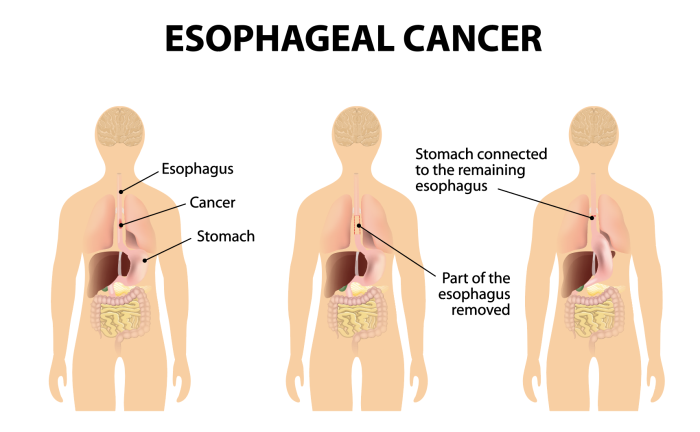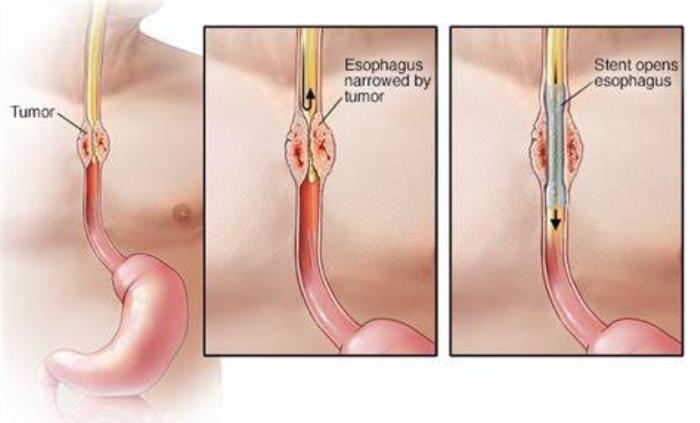Esophageal cancer is a malignancy that arises from the tissues of the esophagus, the tube that carries food from the throat to the stomach. This cancer is often diagnosed at an advanced stage due to its subtle symptoms, leading to a poor prognosis. The management of esophageal cancer is complex and requires a multidisciplinary approach, including surgical, medical, and endoscopic interventions.
Medical disclaimer: This content is for general awareness and does not replace a doctor’s consultation. For diagnosis or treatment decisions, consult a qualified specialist.
The Role of Endoscopy in Esophageal Cancer Diagnosis
Endoscopy plays a crucial role in the diagnosis of esophageal cancer. It allows for direct visualization of the esophagus and enables the physician to obtain biopsies of suspicious lesions. Endoscopic techniques, such as esophagogastroduodenoscopy (EGD), are essential for accurate staging and characterization of the tumor, which is vital for determining the appropriate treatment plan.
Types of Endoscopic Procedures Used in Esophageal Cancer
Several endoscopic techniques are utilized in the management of esophageal cancer, including endoscopic ultrasound (EUS) for staging, endoscopic mucosal resection (EMR) for localized tumors, and endoscopic submucosal dissection (ESD) for deeper lesions. Each procedure serves a specific purpose in the diagnosis and treatment continuum.

Endoscopic Ultrasound for Accurate Staging
Endoscopic ultrasound (EUS) is pivotal in assessing the depth of tumor invasion and the involvement of nearby lymph nodes. This minimally invasive technique provides high-resolution images, allowing for precise staging of esophageal cancer, which is crucial for tailoring treatment strategies and improving patient outcomes.
Endoscopic Mucosal Resection for Early-Stage Tumors
Endoscopic mucosal resection (EMR) is a technique used to remove early-stage esophageal cancers that are confined to the mucosal layer. This procedure not only aids in diagnosis but also offers a curative approach for select patients, minimizing the need for more extensive surgical interventions.
Endoscopic Submucosal Dissection for Advanced Lesions
Endoscopic submucosal dissection (ESD) is a sophisticated technique that allows for the removal of larger, more invasive tumors while preserving surrounding healthy tissue. ESD is particularly beneficial for patients who are not candidates for traditional surgery, providing a less invasive option with favorable outcomes.
Role of Endoscopy in Palliative Care for Esophageal Cancer
For patients with advanced esophageal cancer, endoscopic procedures can offer significant palliative benefits. Techniques such as stenting can alleviate obstructive symptoms, improving the quality of life for patients experiencing dysphagia or other complications from tumor growth.
Combination of Endoscopic and Surgical Approaches
In many cases, a combination of endoscopic and traditional surgical approaches is employed in the management of esophageal cancer. Endoscopy can facilitate surgical planning by providing detailed information about the tumor's characteristics and surrounding anatomy, enhancing surgical outcomes.
Limitations of Endoscopic Procedures in Esophageal Cancer Management
While endoscopic procedures are invaluable, they do have limitations. Not all tumors are amenable to endoscopic resection, particularly those that are deeply invasive or located in challenging anatomical regions. Additionally, the potential for complications such as bleeding or perforation must be considered.

Future Directions in Endoscopic Techniques for Esophageal Cancer
Research is ongoing to enhance the efficacy and safety of endoscopic procedures in esophageal cancer management. Innovations such as robotic-assisted endoscopy and advanced imaging techniques are being explored to improve tumor detection, resection, and overall patient outcomes.
Multidisciplinary Team Approach in Esophageal Cancer Management
The management of esophageal cancer requires a multidisciplinary team approach, including gastroenterologists, oncologists, surgeons, and radiologists. This collaboration ensures comprehensive care, with endoscopic procedures playing a pivotal role in the overall treatment strategy.
Patient Selection Criteria for Endoscopic Interventions
Patient selection is crucial for successful endoscopic interventions. Factors such as tumor size, location, depth of invasion, and overall health status are evaluated to determine the appropriateness of endoscopic techniques, ensuring optimal outcomes for patients with esophageal cancer.
Post-Endoscopic Procedure Care and Follow-Up
Post-procedure care is essential in the management of patients undergoing endoscopic interventions for esophageal cancer. Regular follow-ups, monitoring for complications, and assessing treatment response are critical components of comprehensive care to ensure successful outcomes.
Patient Education on Endoscopic Procedures for Esophageal Cancer
Patient education is vital in the management of esophageal cancer. Informing patients about the purpose, benefits, and potential risks of endoscopic procedures empowers them to make informed decisions regarding their treatment options and enhances their overall experience.
Challenges in Accessing Endoscopic Services in India
In India, access to advanced endoscopic services can be limited due to factors such as availability of trained personnel, healthcare infrastructure, and regional disparities. Addressing these challenges is essential to improve outcomes for patients with esophageal cancer across the country.
Impact of Endoscopic Procedures on Survival Rates
Studies indicate that the use of endoscopic techniques in the management of esophageal cancer can improve survival rates, particularly in early-stage disease. By enabling early diagnosis and less invasive treatment options, endoscopy plays a significant role in enhancing patient prognosis.
Clinical Trials and Research on Endoscopic Techniques
Ongoing clinical trials are investigating the efficacy and safety of various endoscopic techniques in esophageal cancer management. Participation in such trials can provide patients access to cutting-edge therapies and contribute to the advancement of knowledge in this field.
Understanding Survival Rates for Esophageal Cancer Patients
Survival rates provide critical insights into the effectiveness of treatment strategies and prognosis for patients. Understanding survival rates for esophageal cancer patients delves into factors that influence these rates, including early diagnosis, advancements in treatment, and lifestyle changes post-therapy.
The Benefits of Minimally Invasive Surgery for Esophageal Cancer
Minimally invasive techniques have revolutionized esophageal cancer treatment. The benefits of minimally invasive surgery for esophageal cancer outlines how these procedures reduce surgical risks, minimize pain, and speed up recovery, making them a preferred choice for eligible patients.
Integration of Technology in Endoscopic Procedures
The integration of technology, such as artificial intelligence (AI) and advanced imaging techniques, is revolutionizing endoscopic procedures for esophageal cancer. These innovations enhance diagnostic accuracy and treatment precision, paving the way for improved patient outcomes.
Best Esophageal Cancer Treatment in India
The Best Esophageal Cancer Treatment in India involves advanced techniques such as minimally invasive esophagectomy, chemotherapy, and radiation therapy for effective cancer management.
Best Esophageal Cancer Specialists in India
The Best Esophageal Cancer Specialists in India have extensive experience in treating esophageal cancer, offering tailored treatment plans and compassionate care to achieve optimal outcomes.
FAQs on Endoscopic Procedures in Esophageal Cancer Management
What are the main benefits of endoscopic procedures for esophageal cancer?
Endoscopic procedures offer several benefits, including minimally invasive techniques, reduced recovery time, and the ability to perform both diagnostic and therapeutic interventions. These advantages contribute to improved patient quality of life.
Are there risks associated with endoscopic procedures?
Yes, there are potential risks, such as bleeding, infection, and perforation of the esophagus. However, these risks are generally low and should be weighed against the potential benefits of the procedure.
How do I know if I am a candidate for endoscopic treatment?
A thorough evaluation by a multidisciplinary team is essential to determine candidacy for endoscopic treatment. Factors such as tumor characteristics and overall health will be considered in the decision-making process.
What is the recovery process like after an endoscopic procedure?
Recovery varies depending on the specific procedure performed but generally involves monitoring for complications and gradual resumption of normal activities. Patients will receive specific post-procedure care instructions from their healthcare team.
Discover the Best Oncologists and Cancer Hospitals in India
When it comes to cancer treatment, finding the right specialist and hospital can make a significant difference in the outcome. In this blog, we have compiled a list of the top oncologists and cancer hospitals across major cities in India, ensuring that you have access to the best care available.
Top Oncologists in Major Cities
For those seeking expert oncologists, we have identified the best specialists in key cities:
Leading Cancer Hospitals
In addition to finding the right specialist, choosing the right hospital is crucial for comprehensive cancer care. Here are the top hospitals in major cities:
Get more indepth information on Cancer treatments and their costs
Conclusion
Finding the right oncologist and hospital is the first step in your cancer treatment journey. Explore the links above to learn more about the top specialists and hospitals in your area.
Explore esophageal cancer treatment in India, including costs starting from ₹3,00,000, top hospitals, and success rates for better outcomes. Esophageal Cancer Treatment in India: Cost, Top Hospitals and Success Rate
Explore the advantages of minimally invasive surgery (MIS) for esophageal cancer, including reduced pain, lower risk of complications, shorter hospital stays, and quicker recovery times. Learn about different MIS techniques like laparoscopic esophagectomy, thoracoscopic esophagectomy, and robot-assisted surgery. The Benefits of Minimally Invasive Surgery for Esophageal Cancer
Gain insights into the survival rates for esophageal cancer patients, including factors that influence prognosis such as cancer stage, treatment options, and overall health. Understand the importance of early detection and how it significantly improves survival outcomes. Understanding Survival Rates for Esophageal Cancer Patients